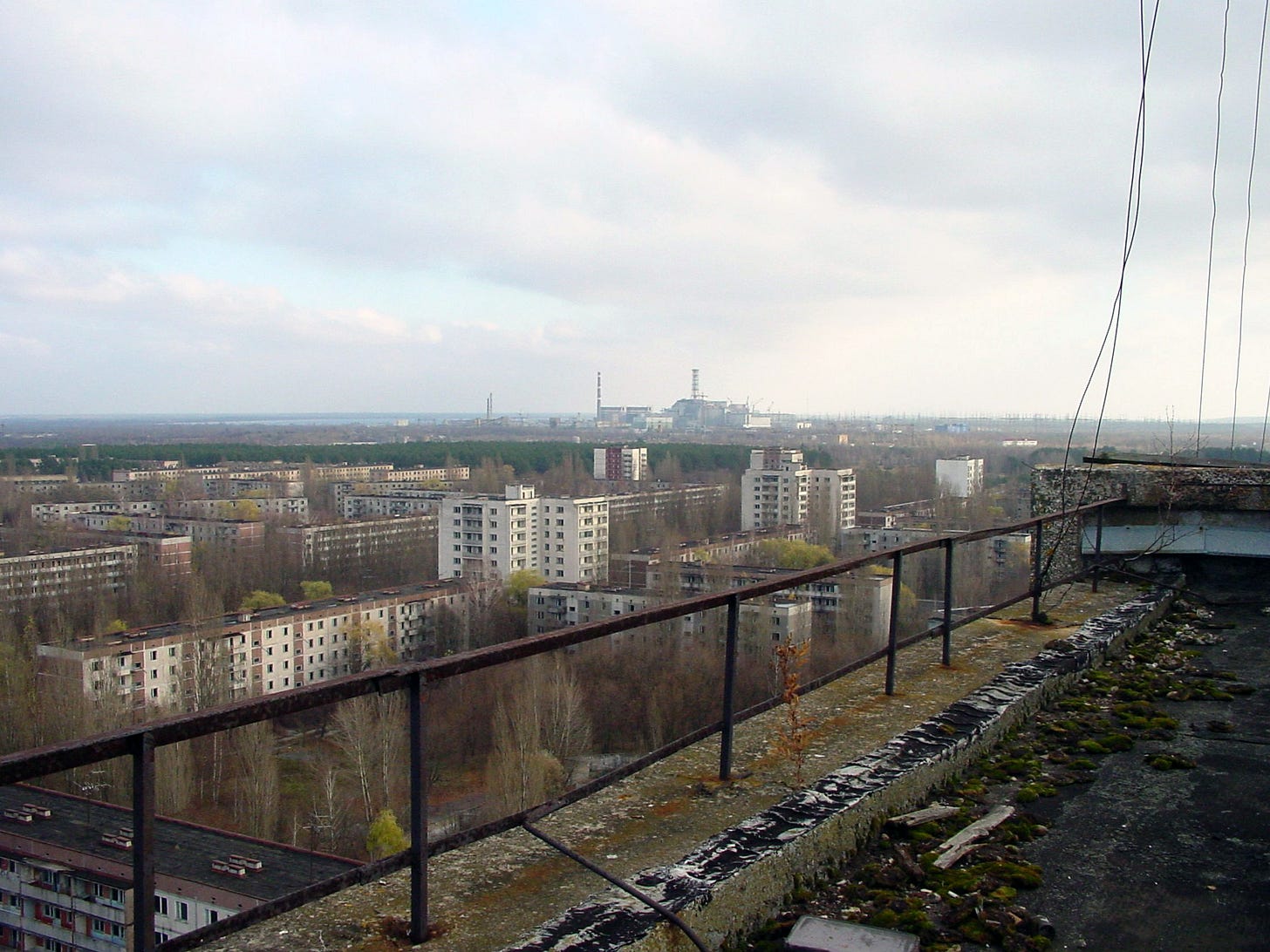At 1:23 a.m. on 26 April 1986, a catastrophic explosion occurred in reactor 4 of the Chernobyl nuclear power plant near the town of Pripyat in Ukraine, then part of the Soviet Union, releasing an invisible but lethal radioactive cloud which spread across borders, mountains and seas.
At the time, I was seven months pregnant, and by the end of that week, almost everything edible became a potential threat to my unborn daughter.
In 1986, world stood at a crossroads. In the USSR Mikhail Gorbachev introduced glasnost (openness) and perestroika (restructuring) signaling the beginning of political and economic reforms. In the West, Ronald Reagan, Margaret Thatcher shaped an emerging new order. The chancellor of West Germany, Helmut Kohl was advocating for European integration, while France navigated an uneasy political cohabitation between the conservative prime minister Jacques Chirac and Socialist President François Mitterrand. Europe was trying to recover from the assassination of Sweden’s Prime Minister, Olof Palme.
The continent remained divided by the Cold War, with Eastern Europe still under Soviet influence, but the European Community was forging deeper political and economic ties, preparing the ground for the European Union.
Then came the explosion at Chernobyl.
The explosions in Chernobyl released large amounts of radioactive material into the atmosphere. Fires broke out which would burn for days. Brave firefighters unaware of the radiation hazard fought the blazes without protective gear. By evening it was clear that the reactor was destroyed and radiation levels were dangerously high. And yet, life in Pripyat went on. Roads were blocked but no warnings were issued. Only the next day, in the afternoon, 36 hours after of the explosion, did the evacuation begin. The residents told it was “just for a few days.” They never returned.

The Soviet Union initially tried to cover up the accident. But by April 28, when Swedish nuclear monitors detected alarming radiation levels and traced them back to the USSR, the cover-up began to collapse. Under international pressure, the Soviet government issued a brief public statement admitting there had been an accident at Chernobyl, but provided few details.
Across Europe, confusion and fear grew. News outlets began reporting on the scale of the disaster, often relying on indirect evidence and satellite imagery, but the full extent of the disaster, including the health risks and environmental impact, remained unclear.
I was living in Greece at the time. Within days, the government implemented emergency controls, testing agricultural products and drinking water for radioactive isotopes, especially iodine and cesium. There was widespread public fear, especially between pregnant women. I watched my neighbours pour out milk and discard fresh produce. In the markets, people whispered about “the cloud” and “the poison from the sky.” Every meal became a grim calculation: Should I drink the water? Eat the salad? Was the bread safe? Some medical professionals recommended minimising outdoor exposure during periods of rainfall, when radioactive particles could be deposited.
As usual rumours ran ahead of science. Reports from across Europe spoke of radiation, birth defects, and miscarriages. In Greece alone, an estimated that 23% of early pregnancies were terminated in the months following the accident, many driven by fear rather than fact. Across Europe, the International Atomic Energy Agency later estimated that between 100,000 and 200,000 pregnancies were ended in the months after Chernobyl.
Initial exposure in Western and Southern Europe was far lower than in the Soviet Union, Belarus, or Ukraine, but the psychological impact was profound. Studies later showed that while there was a measurable increase in anxiety and depression among women of reproductive age, the actual risk to pregnancies in most of Europe was minimal compared to the panic it provoked.
Yet life went on, and the world did not end. My daughter was born in June, small but healthy.
Chernobyl’s radioactive plume faded, but Chernobyl's impact did not. It changed me. For the first time, I realised that even distant disasters can reach into our homes, our bodies, and our children's bodies, without warning.
On this anniversary, I remember the fear, but also – and more importantly the resolve it ignited. Chernobyl steered me toward studying environmental science and politics to understand and address the complex challenges facing our planet. It taught me that while disasters may be born of accident, negligence or hubris resilience and the courage to speak out are always choices we can make
These choices still shape my life today.
Sources:
Chernobyl: Timeline of Events
Chernobyl Accident 1986 - World Nuclear Association
European stillbirth proportions before and after the Chernobyl accident. | International Journal of Epidemiology | Oxford Academic





It’s inspiring how you turned that experience into a lifelong commitment to understanding and protecting our environment. I also never knew about the panic and hysteria that accompanied the Chernobyl disaster. Thank you for sharing 🙏🏿 😊
Interesting! I was born a year later in Germany and I remember my mother telling me similar stories.